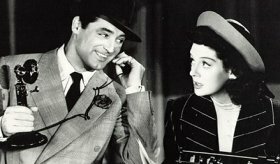|
| Tookey's Review |
|
| Pro Reviews |
|
| Mixed Reviews |
|
| Anti Reviews |
|
| Trailer |
|
| Cast |
|
| |
 |
| |
| Released: |
1940 |
| |
|
| Genre: |
REMAKE
ROMANCE
COMEDY
|
| |
|
| Origin: |
US |
| |
|
| Length: |
92 |
|
| |
|
| |
|
|
| |
|
A grouchy editor (Cary Grant, pictured left) prevents his journalist ex-wife (Rosalind Russell, pictured right) from remarrying, by giving her a news story to report.
|
Reviewed by Chris Tookey
|
|
|
| Grant is cheerfully cunning and callous, Russell is feisty and fun in this inspired re-make of The Front Page . Screenwriter Charles Lederer and director Howard Hawks cleverly introduce an extra dimension into the central relationship, by making it personal as well as professional. Actually, it was Hawks's idea, after he heard an actress read Hildy's part at an after-dinner play-reading. |
| Neither leading actor was ever better or more attractive; and the film's sympathetic portrayal of a career-woman might usefully be studied by some modern writers and directors - although it does makes her burst into tears at the end to prove her underlying femininity. Surprisingly, the script was turned down by four of Hollywood's leading ladies (Jean Arthur, Ginger Rogers, Claudette Colbert and Irene Dunne) before it was snapped up by Russell. |
| Hawks's direction is brilliantly paced, and makes skilful use of overlapping dialogue without ever losing clarity (eat your heart out, Robert Altman). Hawks was not the first director to attempt this; the same technique can be seen in William K. Howard's The Trial of Vivienne Ware (1932). But Hawks and his sound enginers brought it to technical perfection; multiple microphones, as opposed to a single boom mike, made for a new flexibility of movement, with the engineers flicking from one mike to another on cue (today, thanks to radio mikes and multi-track recording, this kind of thing is easy; in 1940, it must have been nerve-jangling). |
| His Girl Friday has the distinction of being among the most acclaimed films of all time. It wasn't always so, for several critics compared it unfavourably with its predecessor; it was ignored at that year's Oscars; and it has never featured in the "10 best" lists published each decade by Sight and Sound magazine. |
| It's cavalier about conventional morality, cynical about the press, callous towards its characters, and a calculatingly commercial piece of film-making. It's also great entertainment and must rank among the wittiest and best acted of all screwball comedies. |
|
|
|
|
